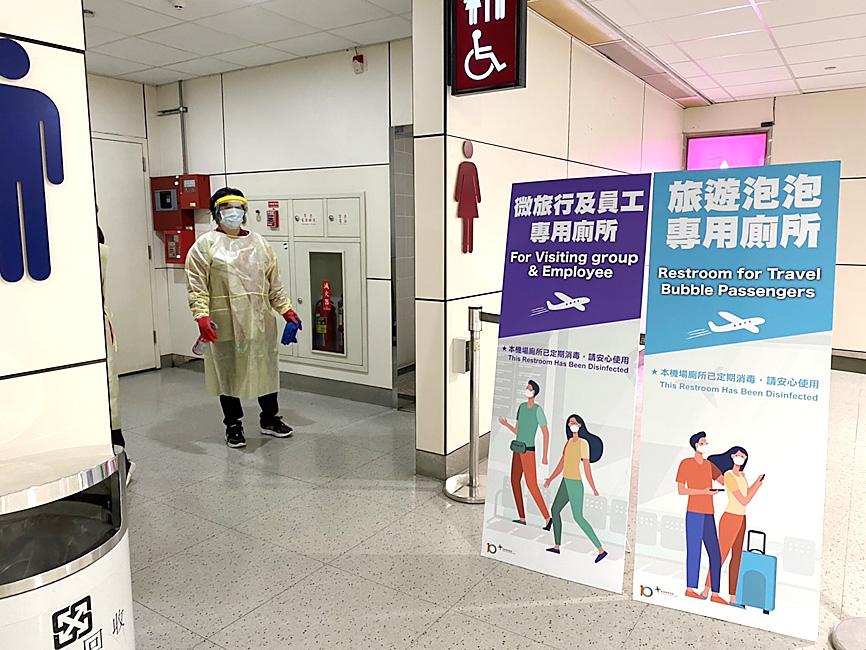The government is considering offering subsidies to Taiwanese visitors to Palau that would cover part of the polymerase chain reaction (PCR) testing fees, Minister of Transportation and Communications Wang Kwo-tsai (王國材) said yesterday.
Taiwan has been allowing people to travel to the Pacific island nation since April 1 via a “travel bubble” agreement between the two countries. While the pilot tours attracted more than 100 Taiwanese tourists, travel operators have since then reported lackluster sales of tours, which caused China Airlines to cancel charter flights to Palau.
One of the reasons for high tour prices is the PCR tests, which travelers are required to undertake both when they arrive at and return from Palau, Wang told reporters, adding that two PCR tests cost NT$10,000.

Photo: Hsiao Yu-hsin, Taipei Times
“Through the subsidies, we hope that tour prices would return to the pre-COVID-19 level, which would motivate more people to travel. The same subsidy program could also be implemented should Taiwan form travel bubbles with Singapore and Vietnam,” Wang said, adding that details of the subsidy program are still in discussion.
The ministry is also studying the possibility of subsidizing PCR tests for international tourists arriving via “travel bubble” agreements, as it would contribute to the growth of the nation’s tourism industry, which has been severely hit by the pandemic, Wang said.
Although the government is in talks with many nations and territories about forming travel corridors, Wang said that tours to Palau remain the ministry’s priority, as they would set an example for how a “travel bubble” agreement should be enforced in terms of arranging tours amid a pandemic.
“The experiences we gain from our opening tours to Palau would become an important point of reference when we discuss other ‘travel bubble’ agreements with the Central Epidemic Command Center,” he said, adding that the center would make the final decision on any other “travel bubble” agreements.
Starting on April 14, Taiwanese returning from Palau only need to observe general self-health management guidelines for 14 days, rather than undergoing a stricter version of self-health management for five days and general health management for another nine days, the Tourism Bureau has said.
Although tourists must still take a PCR test on the fifth day of their return, they are allowed to take public transport to work, it added.
Foreign expatriates in Taiwan who have Alien Permanent Resident Cards or Alien Resident Cards are allowed to travel to Palau through the “travel bubble” agreement as well, the bureau said.
On Monday, Singaporean Minister of Transport Ong Ye Kung (王乙康) said the city-state has submitted a “travel bubble” proposal to Taiwan, along with a proposed program to mutually recognize vaccination certificates.
In related news, the ministry is still studying whether the government should offer relief funds to workers in the travel industry in the second quarter of this year to compensate their loss of income due to the pandemic, Wang said.
The funds would be planned with a vision of boosting tours in the post-pandemic era and elevating overall travel quality, he said.

Taiwan is to commence mass production of the Tien Kung (天弓, “Sky Bow”) III, IV and V missiles by the second quarter of this year if the legislature approves the government’s NT$1.25 trillion (US$39.78 billion) special defense budget, an official said yesterday. Commenting on condition of anonymity, a defense official with knowledge of the matter said that the advanced systems are expected to provide crucial capabilities against ballistic and cruise missiles for the proposed “T-Dome,” an advanced, multi-layered air defense network. The Tien Kung III is an air defense missile with a maximum interception altitude of 35km. The Tien Kung IV and V

The disruption of 941 flights in and out of Taiwan due to China’s large-scale military exercises was no accident, but rather the result of a “quasi-blockade” used to simulate creating the air and sea routes needed for an amphibious landing, a military expert said. The disruptions occurred on Tuesday and lasted about 10 hours as China conducted live-fire drills in the Taiwan Strait. The Civil Aviation Administration (CAA) said the exercises affected 857 international flights and 84 domestic flights, affecting more than 100,000 travelers. Su Tzu-yun (蘇紫雲), a research fellow at the government-sponsored Institute for National Defense and Security Research, said the air

A strong continental cold air mass is to bring pollutants to Taiwan from tomorrow, the Ministry of Environment said today, as it issued an “orange” air quality alert for most of the country. All of Taiwan except for Hualien and Taitung counties is to be under an “orange” air quality alert tomorrow, indicating air quality that is unhealthy for sensitive groups. In China, areas from Shandong to Shanghai have been enveloped in haze since Saturday, the ministry said in a news release. Yesterday, hourly concentrations of PM2.5 in these areas ranged from 65 to 160 micrograms per cubic meter (mg/m³), and pollutants were

Taiwan’s armed forces have established response protocols for a wide range of sudden contingencies, including the “Wan Chun Plan” to protect the head of state, the Ministry of Defense (MND) said today. After US President Donald Trump on Saturday launched a series of airstrikes in Venezuela and kidnapped Venezuelan President Nicolas Maduro, concerns have been raised as to whether China would launch a similar “decapitation strike” on Taiwan. The armed forces regularly coordinate with relevant agencies and practice drills to ensure preparedness for a wide range of scenarios, Vice Minister of National Defense Hsu Szu-chien (徐斯儉) told reporters before a